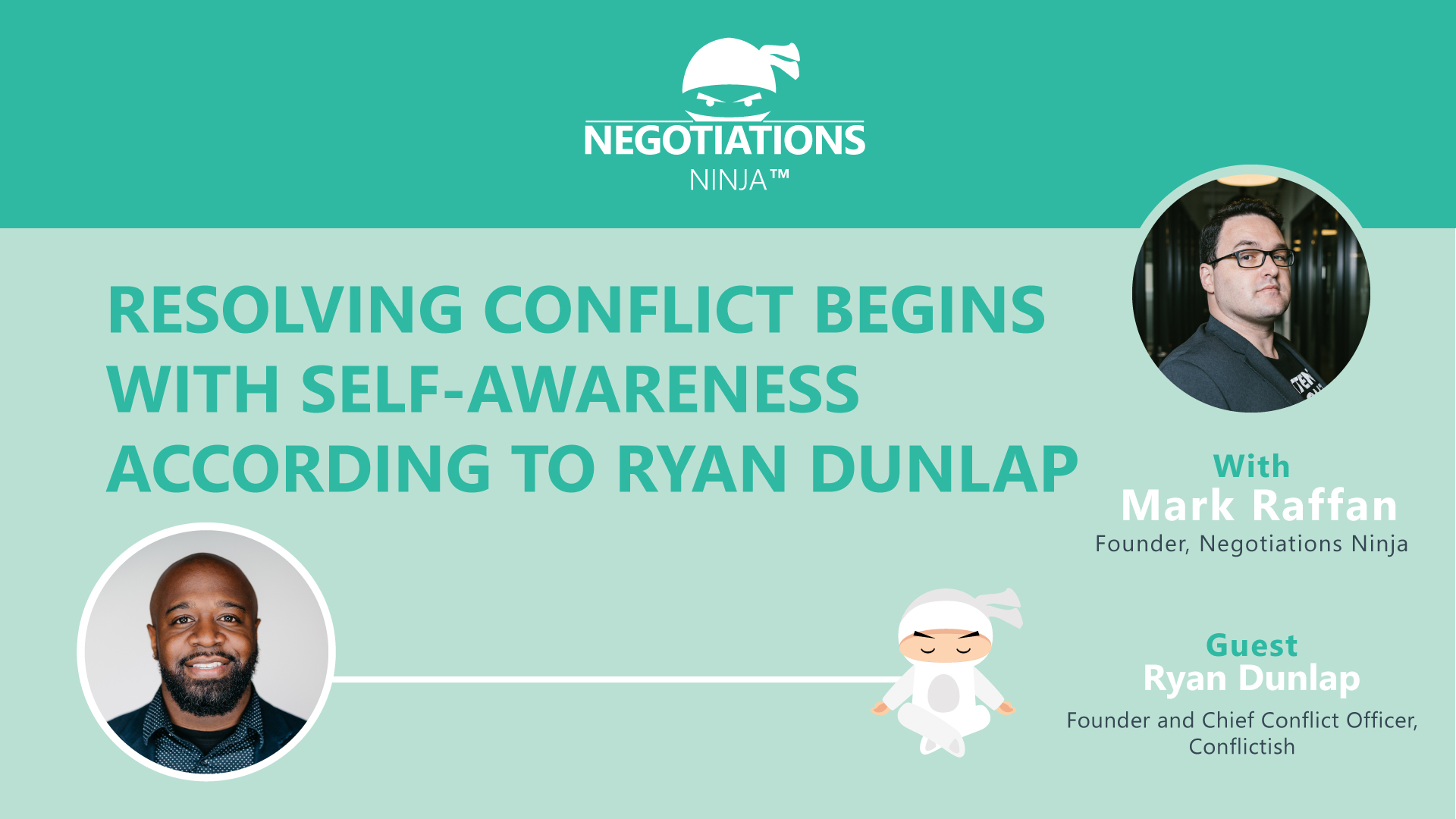Self-confidence and self-control in conflict are difficult things to master. And you can’t resolve conflict with others until you learn to resolve conflict within yourself. This takes an incredible amount of self-awareness. In this episode of Negotiations Ninja, Ryan shares how you can learn to resolve conflict the right way by starting with knowing yourself.
Outline of This Episode
- [2:01] Learn more about Ryan Dunlap
- [4:01] Resolving conflict within yourself
- [7:40] Why scripts don’t get the desired outcome
- [10:33] How to become more self-aware
- [14:32] The best alternative to an ideal outcome
- [19:17] How to learn better self-control
Resolving conflict within yourself
Everyone has habits and behaviors that they carry with them. They’re our issues—or “ish,” as Ryan likes to say—that contribute to conflict, tension, and misunderstanding. We’re often unaware of how our behavior influences conflict (or causes it to escalate). Most of us are unaware of how we’re negatively impacting the people we’re talking to.
When people are trying to resolve conflict, they’re trying to resolve a problem. They often fail to recognize that the problem is their relationship with other people.
Ryan helps people get honest with themselves about themselves and their conflict-causing behaviors and tendencies. They have to be honest with themselves. Ryan calls the work “messenger development.” You have to focus on who you are before transitioning into message delivery (the words you say).
It’s about what you say, how you say it, and who is saying it. Messenger bias is an important aspect of how communication is received. Our verbal and non-verbal communication are being interpreted by others. That’s why who you are is as important as what you’re saying and how you’re saying it.
You can have the right words for the right person, but if they don’t like you, you won’t resolve conflict with them.
Why scripts don’t get the desired outcome
When Ryan was in law enforcement, they were required to complete defensive tactics training. They’d practice with each other in the academy. But when they got on the street and encountered an actual fight, nothing they practiced worked. Why? When you train, you train with passive resistance. You allow the other person to do the technique on you.
It’s the same when you’re given scripted responses to conflict resolution. The moment you encounter someone who is no longer reasonable or rational and they don’t want to resolve the tension, they’re operating out of their limbic brain. The strategies won’t work. You have to transition from a resolution mindset to a de-escalation mindset. That requires a different set of skills.
You have to know yourself well when you try to de-escalate someone else because your emotions can’t get in the way. Your bias can’t get in the way. Your automatic responses can’t get in the way. You have to give the other person room to be human and transition from their reptilian brain to a calm space to contribute to resolution.
How to become more self-aware
You need someone in your corner who can give you actionable feedback—that allows you to see yourself differently—and can generate psychological safety to face yourself. You must also be willing to have a conversation about who you are without allowing your identity to be at risk.
People attach their identities to feedback. Removing your identity from the process of growth allows you to be present for the conversation, the correction, and the growth that happens.
We’re asking for someone to come alongside us and expose the aspects of ourselves that we’re not proud of (or embarrassed and ashamed of). Talk about the thing(s) and get back in alignment with who we are.
Surround yourself with people who have a genuine interest in your growth and can help you identify areas you need to improve upon.
Ryan shares some tactics you can use to navigate conflict in this episode. Don’t miss it!
Resources & People Mentioned
- Insight by Tasha Eurich
Connect with Ryan Dunlap
- Conflictish™
- Ryan’s training and workshops
- Friend on Instagram
- Connect on LinkedIn
Connect With Mark
- Follow Negotiations Ninja on Twitter: @NegotiationPod
- Connect with Mark on LinkedIn
- Follow Negotiations Ninja on LinkedIn
- Connect on Instagram: @NegotiationPod




